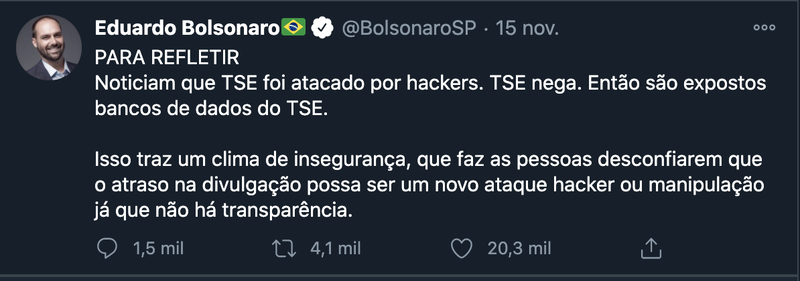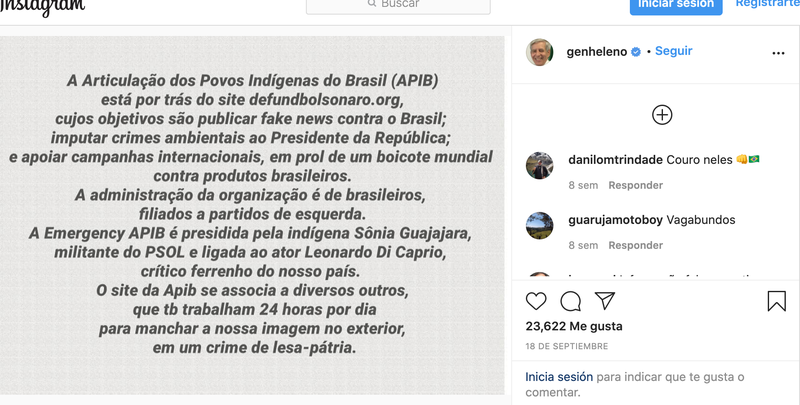Brazil is not just Latin America’s largest democracy, it is a major social media power. Approximately 140 million of the country’s 212 million citizens are regular social media users. Nearly two thirds of the population is on Facebook and around one third of Brazilians use Instagram. Brazil is also among the top five countries by user count on Twitter and Youtube, and TikTok subscriptions are surging. In Brazil, as other countries, elections are profoundly influenced by what goes on in cyberspace. Most political candidates are active users of social media across multiple platforms. Brazilian opinions are increasingly shaped online.
The 2018 presidential elections were rife with misinformation and deepened political fault-lines in Brazil both online and off. Waves of social media campaigns on Facebook and bulk mailings on encrypted tools like WhatsApp were deeply polarizing. Brazilians quickly splintered into several camps including hard core supporters of Bolsonaro and a dispersed opposition spanning the center and left. like-minded groups are still isolated from one another online, but the government’s failure to manage COVID-19 may have helped push the population to the center.
Social media is the dominant battlespace in which politicians mobilize their digital mobs for political advantage. In Rio de Janeiro, during the first round of the elections, incumbent mayor Marcelo Crivella, who is supported by the president, frequently used social media to attack his rivals including Eduardo Paes, a former mayor. Crivella and Bolsonaro are adept at mobilizing their followers to the cause: Between Oct. 9 and Oct. 21, there were roughly 3,400 posts defaming Paes on Facebook, in public groups, and on verified profiles. These posts generated over 1 million interactions and 4.2 million views. Crivella and Eduardo Paes are now competing in the second round on Nov. 29.
Meanwhile, in São Paulo, right wing mayoral candidate Celso Russomano’s campaign shared a video on WhatsApp falsely accusing leftwing candidate Guilherme Boulos of being responsible for the collapse of an irregularly occupied building several years earlier. It didn’t seem to help him—Russomano lost to Boulos in the first round, despite support from Bolsonaro. According to the fact-checking agency Aos Fatos, of the 44,052 Facebook posts related to municipal elections during the last week of October, 4,675 were considered “fake” and 2,492 of those were posts attacking Boulos.
While digital disinformation is widespread, this does not mean that it is tolerated. After reports emerged of widespread abuse on Facebook and WhatsApp during the 2018 presidential elections, the Brazilian state intervened. Specifically, an inquiry committee of the Brazilian Parliament exposed a so-called “hate cabinet” overseen by Carlos Bolsonaro. The hate cabinet allegedly oversaw a sprawling network of fake news channels, right-wing blogs and social media profiles aggressively spreading disinformation and threatening opponents, including via Facebook, Instagram, Youtube and WhatsApp.
Predictably, targets of the hate cabinet included left-wing journalists, opposition politicians, outspoken artists, and independent media outlets critical of Bolsonaro and his inner circle. A parallel investigation was also launched by the Brazilian Federal Police to uncover who was responsible for organizing and financing demonstrations against the Brazilian Supreme Court. Again, the president’s son and several aides close to the president were singled out as the likely culprits. Investigations are ongoing and several financial backers of these campaigns are being identified.
There are a few tweets that highlight the kind of misinformation that’s out there:


And there are these examples too:
1- Congresswoman Carla Zambelli, a fierce Bolsonaro supporter, uploads a video commenting about Bolsonaro’s inter-ministerial meeting that was disclosed by the STF. Zambelli gives a message supporting Bolsonaro’s extremists’ views about the pandemics and gun-ownership shown during the meeting. Zambelli also rallies Bolsonaro’s supporters to attend a protest to defend the president and asks the policeman to disrespect any superior orders to disrupt the manifestations.
2- Congressman Eduardo Bolsonaro insinuates that the US Elections were rigged by the left and asks his supporters to pay attention to what may happen during the municipal elections in 2020:

3- General Heleno, head of GSI, falsely accuses the Brazilian Indigenous People Articulation of coordinating the website defundbolsonaro.org, stating that defundbolsonaro.org aims to disseminate fake news about the president and to falsely accuse him of environmental crimes.


Robert Muggah | Radio Free (2020-11-23T10:35:10+00:00) Digital misinformation not only threatens Brazil’s 2020 municipal elections, it undermines democracy. Retrieved from https://www.radiofree.org/2020/11/23/digital-misinformation-not-only-threatens-brazils-2020-municipal-elections-it-undermines-democracy/
Please log in to upload a file.
There are no updates yet.
Click the Upload button above to add an update.
